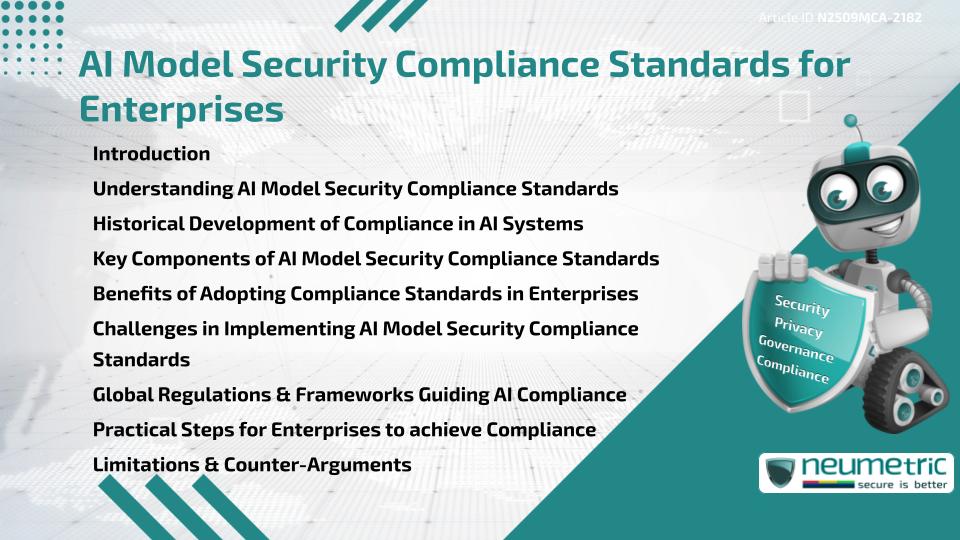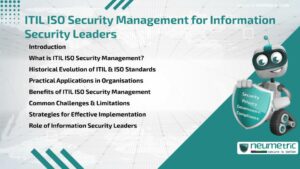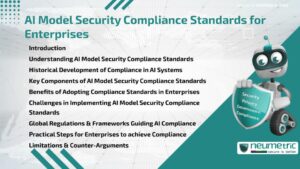Table of Contents
ToggleIntroduction
Enterprises are increasingly deploying Artificial Intelligence across industries, which raises critical concerns about security, data handling & accountability. To address these concerns, AI Model security compliance standards serve as structured guidelines that help Organisations safeguard their models against Risks such as data breaches, bias & regulatory violations. These standards provide enterprises with frameworks for Governance, model monitoring & adherence to global rules like GDPR, HIPAA & ISO 27001. By adopting these practices, Organisations not only ensure security but also maintain trust with customers, regulators & Stakeholders.
Understanding AI Model Security Compliance Standards
AI Model security compliance standards are sets of principles, Policies & frameworks that enterprises must follow when developing, deploying & monitoring AI Models. These standards are designed to cover essential aspects like Data Privacy, algorithmic transparency, accountability & resilience against Threats. For example, ensuring that training data is anonymized or protected aligns with Privacy requirements, while documenting model decisions supports accountability.
Historical Development of Compliance in AI Systems
Compliance standards have roots in broader technology Governance practices. Early frameworks such as ISO 27001 were developed for Information Security & later adapted to address AI-specific Risks. Over time, the need for regulations to cover algorithmic bias, explainability & automated decision-making has grown. This historical evolution highlights how traditional security compliance frameworks have been expanded to meet the unique requirements of AI-driven enterprises.
Key Components of AI Model Security Compliance Standards
Enterprises adopting these standards typically address several core areas:
- Data Security & Privacy: Ensuring training data is anonymized & protected under regulations like GDPR.
- Model Governance: Establishing clear Policies for oversight, version control & auditability.
- Threat Resilience: Protecting against adversarial attacks that exploit model weaknesses.
- Transparency & Explainability: Making model decision-making processes understandable for regulators & Stakeholders.
- Ethical Use: Ensuring models avoid bias & respect fairness principles.
Benefits of Adopting Compliance Standards in Enterprises
Compliance provides enterprises with multiple advantages. It reduces Risks of Financial penalties by meeting global regulations, enhances Customer Trust & strengthens brand reputation. Moreover, standards improve operational efficiency by setting clear processes for managing models throughout their lifecycle. Similar to Quality Management in Manufacturing, compliance introduces checks & balances that prevent costly errors.
Challenges in Implementing AI Model Security Compliance Standards
Despite their importance, implementing AI Model security compliance standards is not without challenges. Enterprises often face high costs in adopting & maintaining frameworks. Technical hurdles such as ensuring explainability of deep learning models can be complex. There is also the challenge of keeping pace with rapidly evolving regulations across multiple jurisdictions. Smaller enterprises may find it especially difficult to meet these obligations due to limited resources.
Global Regulations & Frameworks Guiding AI Compliance
Several global frameworks & laws directly or indirectly influence AI compliance:
- General Data Protection Regulation [GDPR] in the European Union, which requires Data Protection & algorithmic transparency.
- Health Insurance Portability & Accountability Act [HIPAA] in the United States, governing health data use in AI.
- ISO 27001 for Information Security management.
- OECD AI Principles which promote responsible AI adoption worldwide.
These regulations create a foundation for enterprises to align their AI Practices with global norms.
Practical Steps for Enterprises to achieve Compliance
Enterprises can take actionable steps to implement compliance:
- Conduct Risk Assessments for AI Systems.
- Develop internal Governance Policies.
- Train Employees on responsible AI Practices.
- Document & Audit AI Model decisions.
- Collaborate with legal & compliance experts to ensure alignment with Global Standards.
By taking these steps, Organisations can systematically meet compliance expectations & build robust AI Systems.
Limitations & Counter-Arguments
While valuable, AI Model security compliance standards are not perfect. Critics argue that standards may create additional bureaucracy, slowing down innovation. Some regulations may also be too rigid, failing to account for industry-specific needs. Moreover, compliance alone does not guarantee ethical or fair outcomes; it merely sets minimum requirements. Enterprises must therefore balance compliance with proactive ethical considerations.
Conclusion
AI Model security compliance standards offer enterprises a Framework for protecting AI Systems, safeguarding data & meeting regulatory requirements. They are essential for Risk Management & trust-building, yet they come with implementation challenges & limitations.
Takeaways
- AI Model security compliance standards safeguard enterprises against Risks.
- Global frameworks like GDPR, HIPAA & ISO 27001 shape compliance.
- Enterprises gain trust, reputation & operational efficiency from compliance.
- Implementing compliance requires resources, Governance & continuous updates.
- Compliance alone is not enough; ethical practices are equally important.
FAQ
What are AI Model security compliance standards?
They are structured frameworks & Policies that ensure AI Models meet Data Protection, Governance & ethical requirements.
Why are AI Model security compliance standards important for enterprises?
They protect enterprises from legal Risks, enhance Customer Trust & ensure AI Systems operate securely & responsibly.
Which global regulations guide AI compliance?
Major regulations include GDPR in the EU, HIPAA in the US, ISO 27001 & OECD AI Principles.
What challenges do enterprises face in implementing compliance?
Challenges include high costs, technical complexity & keeping up with evolving regulations.
Do compliance standards guarantee ethical AI use?
No, compliance sets minimum requirements, but enterprises must go beyond compliance to ensure fairness & ethics.
How can enterprises start achieving compliance?
They can begin with Risk Assessments, Governance Policies, Employee Training & ongoing audits of AI Systems.
Need help for Security, Privacy, Governance & VAPT?
Neumetric provides organisations the necessary help to achieve their Cybersecurity, Compliance, Governance, Privacy, Certifications & Pentesting needs.
Organisations & Businesses, specifically those which provide SaaS & AI Solutions in the Fintech, BFSI & other regulated sectors, usually need a Cybersecurity Partner for meeting & maintaining the ongoing Security & Privacy needs & requirements of their Enterprise Clients & Privacy conscious Customers.
SOC 2, ISO 27001, ISO 42001, NIST, HIPAA, HECVAT, EU GDPR are some of the Frameworks that are served by Fusion – a SaaS, multimodular, multitenant, centralised, automated, Cybersecurity & Compliance Management system.
Neumetric also provides Expert Services for technical security which covers VAPT for Web Applications, APIs, iOS & Android Mobile Apps, Security Testing for AWS & other Cloud Environments & Cloud Infrastructure & other similar scopes.
Reach out to us by Email or filling out the Contact Form…





